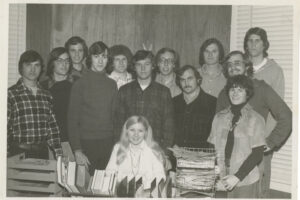Trisha Talbert twists her brand new engagement ring around her finger so that the diamonds–there are many of them–face in, toward her palm. She does this before walking into class, the cafeteria, her new internship.
This time though, she’s walking into her first class of the spring semester of her junior year as a psychology major at Point Loma Nazarene University. As she enters the room, she surreptitiously hides her left hand–she’s not yet ready to talk about it.
Part of her concern is because, she says, “I don’t really tell people a lot because I get uncomfortable. I think the stigma is, ‘of course you’re engaged to a Marine at 21,’ and I don’t really want to deal with that.”
She and her fiancé, Joey Snapp, picked out the ring together over Christmas break, but Snapp is waiting for an upcoming trip to Disneyland to make it photo official, a trip that they’ll plan if he ever gets the time off of work.
Snapp, a lance corporal in the Marines, asked Talbert to keep the ring because his door in the barracks in Twenty-Nine Palms, California, doesn’t lock and he’s worried that someone might steal it.
When Talbert started at Point Loma in the fall of 2015, Snapp went into Marine Corps boot camp, also in San Diego. While she was still pursuing her degree, he was deployed in Iraq for seven months. After she graduates from Point Loma, and then continues her education, he will still be in the military.
According to Point Loma Nazarene University’s Institutional Research Department’s fall 2017 data points, Point Loma has 3,150 students enrolled in its undergraduate programs, of which, 2,670 students are considered traditional undergraduates.
Brent Goodman, the director of Point Loma’s Institutional Research Department, says that 1 in 10 Point Loma students are either active military, veterans, or married to someone in the military. Clearly, the campus is no stranger to military life.
In late 2017, an American College Health Survey was distributed to Point Loma students and 750 traditional undergraduates responded. This survey shows that 92.5% of respondents are unmarried, 6.0% are married, and 1.6% are separated or divorced.
With these numbers in mind, it’s hard to ignore the population at Point Loma that is either married or involved in military life–or in some cases, both.
Victoria Davis, a senior journalism major at Point Loma, is married to Bill Davis, a sergeant in the Marines. When they were just getting to know each other during high school, the Marines had already affected their relationship. “Actually, when he asked me out, I said no because he was going to join the Marines. He had all these plans, and I knew that I was going to college here. I wanted to be friends more than anything and he turned out to be my best friend.”
After months of talking, they finally began to officially date. Bill’s leaving for bootcamp in the midst of their dating relationship forced them to make a decision for what they wanted for their futures. Despite her initial hesitations about his career, Victoria was committed to Bill for the long-term. They got married when she was 20 and he was 19, and moved from their hometown in Minnesota to Southern California where Bill is stationed at Camp Pendleton.
Victoria says that being married has not negatively affected her other relationships, thanks in large part to how much she and her husband trust each other in regards to spending time with friends of the opposite sex. Victoria, who grew up with brothers, enjoys spending time with guy friends, and being married has actually made those relationships less complicated–there’s no question anymore of what the relationship means.
The couple has found ways to incorporate other people into their lives. Victoria says, “If I have a long day at school, he will come out to visit. He’s gotten to meet 90% of my friends here and they all love him, so I think I just try to incorporate him in my life here, and people have gotten more used to it. I think I’m seen less as ‘the married girl’ and more of ‘oh, it’s just Victoria and she just happens to be married.’” Victoria says that the key to having successful relationships outside of their marriage has been making sure that they’re not isolated in their marriage.
However, marriage is not without its sacrifices. Victoria makes sure that she’s home for dinner everyday, despite a 20 hour-a-week internship, school and an hour commute each way from their home at Camp Pendleton, where Bill is stationed.
Victoria says that her schedule changed though when Bill deployed. “When he was deployed, I did not go home that much, except to feed my cats.” Bill deployed for seven months, and the experience was difficult, but surprisingly not as tough as Victoria expected, thanks to the ability to communicate throughout the deployment.
Getting married to someone in the military often carries negative connotations, and Victoria points to this, saying, “A lot of military couples don’t get married because they’re in love, they get married to get out of the barracks, which is sad. I don’t understand how people don’t think through the fact that they do have to live with this person, they have to share a life.” She is careful to clarify, saying that many military couples are very happy and very in love–she mentions friends of theirs that illustrate how successful military relationships can be.
Victoria’s biggest takeaway from being in a military relationship is that, “People don’t realize that they change a lot after time apart. Even Bill, he changed a lot in boot camp, and he changed a lot after deployment. I changed too and we had to get to know each other again.” The key, she says, is to get to know each other again every time your military spouse comes back.
Talbert agrees with Victoria and cautions anyone in a relationship with someone in the military. She says, “Make sure he’s a good guy. I’m one of the lucky ones because I got a good guy, but I know a lot of girls who didn’t and now they’re stuck in the marriage or going through horrible divorces. I would recommend that you know someone really well before you marry them because it’s a really stressful job. It changes people.”
However, Talbert does not feel that the military has changed Snapp for the worse. The only real difference that she sees in him is extra maturity, and maybe a bit more cockiness. But she points out that that’s probably just part of the testosterone-filled barracks.
In regard to how Talbert and Snapp feel about each other, Snapp shares his steadfast love for his fiancee, even with the added complications of the Marines. “I don’t think the Marines has changed our relationship too much, at least not the way we feel about each other,” he says, “it’s just made it a little bit harder because we don’t get to see each other every day.” This is a struggle for many military couples, especially those who deal with one spouse being stationed in a different state, or even in a different country.
Like any couple, they deal with differences of opinion with their futures, and Snapp’s military career goals only complicate an already fraught discussion. Snapp says, “We both have different goals [for the future], so when we talk about the future it’s always stressful.” Snapp does say, however, that being with Talbert has changed his view of marriage and having a family. Growing up with a single mother taught Snapp to value autonomy above all else, but Talbert has helped to change those views.
Interestingly enough, Talbert feels like Snapp being in the military frees them up in some ways, because of the added reassurance of job stability and a steady paycheck, along with all of the military benefits. She compares their experience to that of a more traditional student: “that would be harder because there wouldn’t be that stability with a steady paycheck,” she says, “in that respect, I think being engaged to a Marine would probably happen sooner and be a little less stressful financially.”
Military.com analyzed a 2014 report by the Office of the Deputy Assistant Secretary of Defense under contract with ICF international, which illustrates that while the civilian marriage rate between 2000 and 2012 has fallen from 57.4% to 50.5%, the military marriage rate has gone up, from 53.1% to 56.1%. There are many reasons that this could be the case, ranging from certain religious viewpoints being slightly more prevalent in the armed forces, to the financial benefits of being married while in the military. Additionally, many people feel that the military encourages high levels of maturity in very young people, which may lead to marriage at a younger age.
In a survey conducted by Military.com, among 1,200 active-duty military couples, where the husband is in the military, and the wife is a civilian, the average age of marriage was 22 years old, four years lower than the average age at the time of the marriages. This lower than average marriage age can make relationships less successful and can lead to higher rates of divorce. Additionally the same survey from Military.com shows that military couples moved about twice as much (8.6 times in 20 years) as civilian couples, which adds stress and upheaval to relationships.
A factor in any relationship where one spouse is in a high-stress or high-danger career is how fear changes their situation. Talbert considers this a huge factor in any negative feelings she has towards Snapp, saying, “I think that it puts more anxiety and fear in me, and that projects into my relationship and my feelings about the future of the relationship.” Additionally, because Snapp does not have those same worries of safety and fear for others in his life, it’s difficult for him to understand his fiancee’s perspective.
In this same way, Talbert says that communication is vital to their relationship, even more so than an average couple. If she isn’t careful, she forgets to share her own stresses and hardships in life because she feels like Snapp’s stresses far outweigh her own. This can lead to unhealthy feelings between them, just like it would in any relationship. Additionally, most members of the military deal with sporadic work schedules and as such, clear and open communication is even more important in order for the relationship to be successful.
From the beginning of their relationship, Talbert says that Snapp only has asked for her support. He confirms this, saying, “Just be supportive, and [also have] two-way communication…no matter what job you have in the military, there is going to be stress and you’re going to have hard days. If you’re that person who’s dating someone in the military, I think that being supportive is the best thing you can do.” He says that Talbert’s support helps him to recover from the daily stresses of his job and help him to realize that those bad days will come and go.
✦✦✦✦
Talbert walks into that first science class of the spring semester, with her engagement ring hidden in her palm, torn between wanting to discuss the exciting new development in her life, and shying away from the variety of reactions she may soon experience.
Sitting nearby is a fellow student, who also wears a ring on her left hand, and Talbert feels comforted by her camaraderie and presence. As the days pass, she wears her ring facing outward more and more.








Add Comment